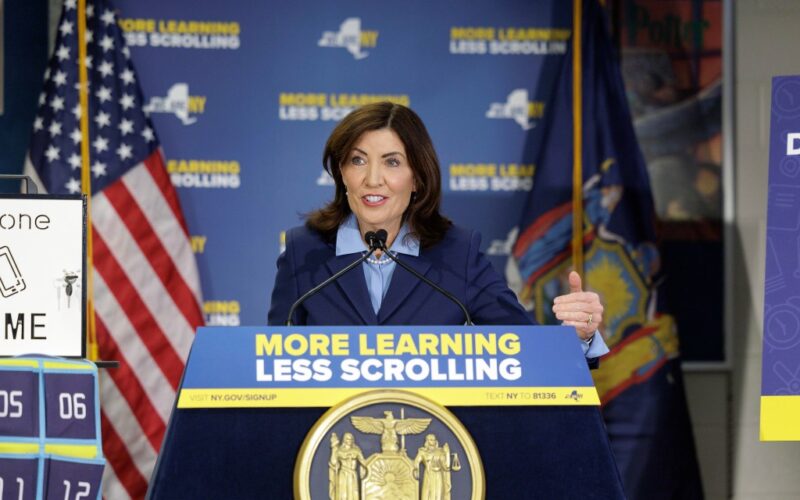With just days left to finalize the state budget, New York lawmakers are getting behind Gov. Hochul’s signature plan to ban cellphones all school day.
The proposal, known as a “bell-to-bell” policy because it separates students from their devices upon arrival until dismissal, had initially been met with some reluctance in the Legislature. Hochul’s sweeping $13.5-million plan would be in effect even during lunch and free periods.
“We believe that our young people in school should be focused on learning, and they do not need the distraction of the cellphone,” Senate Majority Leader Andrea Stewart-Cousins told reporters Wednesday. “As of around yesterday, the majority of the members are more comfortable with a bell-to-bell approach.”
AP Photo/Hans Pennink
Senate Majority Leader, Andrea Stewart-Cousins, D-Yonkers, speaks with reporters after listening to New York Gov. Kathy Hochul present her 2025 executive state budget in the Red Room at the state Capitol, Tuesday, Jan. 16, 2024, in Albany, N.Y. (AP Photo/Hans Pennink)
“This isn’t happening today. It would happen during the next school year,” she added. “We want to make sure there’s appropriate flexibility [for exceptional circumstances]. But our general consensus is bell-to-bell makes sense.”
In their responses to the governor’s budget proposal earlier this year, the Senate suggested schools permit cellphone access during “non-instruction time.” Meanwhile, the Assembly left out the measure from its draft plans, raising concerns that schools could need more funding to implement the restrictions.
It has also faced opposition from statewide groups representing school boards, superintendents and building administrators, saying they have already adopted policies to address the dangers of cellphones. Some parents, too, worry about not being able to reach their children — though lawmakers insist there are measures baked into the plan for that.
“Most importantly, the teachers are not able to get through to their students in the classroom,” said Sen. John Liu (D-Queens), chair of the New York City education committee. “And if we are to actually effectively educate schoolkids, this cellphone ban is necessary.”
For now, Liu thinks the $13.5 million allocation is enough: “It is sufficient, certainly as a first go-around. If experience bornes out that more money is needed, I think we will address that.” He estimated New York City schools would receive roughly $8 million of that statewide set-aside.
Assembly Democrats indicated earlier this week they, too, were coming around to Hochul’s bell-to-bell policy, as first reported by POLITICO.
“I think the vast majority of the members are probably more comfortable with bell-to-bell,” Assembly Speaker Carl Heastie told reporters Tuesday. “Every school district has their own issues, ideas. But I would say the conference is probably much closer to the bell-to-bell.”
The proposal has received strong support from New York state and city teachers unions. Mayor Adams and his schools chancellor, Melissa Aviles-Ramos, also back Hochul’s plan, though have asked for more funding from the state to implement it.
“We strongly believe cellphones should be banned in school,” Adams said during a school mental health press conference last week at P.S. 35 in the Bronx. “The science is clear that cellphones are really distracting our students, our teachers. It’s adding to bullying, it creates an unhealthy environment.”
“The help from the state will help a lot. The dollar amount that the governor put in to accomplish this is not going to meet the real financial challenge. But that is our goal: We would like to go into the next school year with a real plan.”
Hochul, in introducing her proposal, had framed a school cellphone ban as a logical next step after she pushed through legislation last year to regulate social media companies’ dealings with minors. In a statement released by her office Wednesday, she described additional restrictions as essential.
“After speaking with students, teachers, parents, administrators and mental health experts, Gov. Hochul proposed bell-to-bell restrictions on cellphone use. The Governor will continue advocating for this critical policy as budget negotiations continue,” it read.
A final state budget is due by April 1.








